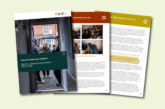Digital innovator Plentific launched The State of Social Housing 2025/26 report at the Housing Community Summit in Liverpool, outlining how the balance of investment, governance, organisational capability and technology must align for the UK housing sector to adapt, comply and thrive.
With housing associations facing mounting pressures including increased costs, labour shortages, stronger compliance standards and legacy systems, leading technology partner Plentific’s Report provides a comprehensive bird’s-eye view of critical investment shifts, as well as intelligence available to housing providers to build resilience and best navigate regulatory reforms and organisational transformation.
Real-time property operations pioneer Plentific has developed its model as a situation analysis framework to understand the interplay of financial, regulatory, organisational and technological pressures, balancing compliance demands with resident-focused culture, assisted by strong data foundations and technology.
Plentific’s Four Forces Framework focuses on external forces impacting housing associations including investment capacity and governance standards. Internal forces feature organisational capability, in terms of people and processes, as well as systems and intelligence, highlighting the necessity of reliable data, intelligent automation and the orchestration of systems.
This Report frames organisational capability not just as a back-office concern but as the engine room for meeting the sector’s expanding obligations. Moreover, systems and intelligence are viewed as the multiplier for the sector’s ability to handle new pressures of rising labour shortages, tight labour markets and growing resident expectations.
Well designed data architecture is seen as the bridge to connect the UK housing sector, with automation and orchestration essential to redirect finite human resources to the most value-added work, importantly transforming resident interactions from transactional to proactive, building trust.
Cem Savas, CEO of Plentific, said: “The landscape of social housing in the UK stands at a pivotal juncture, marked by both unprecedented opportunity and significant operational demands. The State of Social Housing 2025/26 offers a comprehensive, bird’s-eye view of the critical investment shifts and regulatory reforms defining the coming years.
“At Plentific, we believe delivering decent, safe homes where residents feel heard and respected is the outcome of four powerful forces working in concert: Investment Capacity, Governance, Organisational Capability in terms of people and processes, as well as Systems & Intelligence, focusing on data and systems.
“In this evolving landscape, technology is emerging as the bridge between where we are and where we aspire to be as a sector, enabling housing providers to navigate these complexities, grow sustainably and truly deliver on the promise of safe, decent and respectful homes for all.
“Ultimately, the right technology solutions are much more than just a support system; they are accelerators of competence, consistency and culture. The providers leading the way are those who see technology not as a bolt-on, but as part of their organisational identity.”
Elly Hoult, COO at Peabody and President of the Chartered Institute of Housing, emphasised the importance of culture and professionalism: “Reading this Report, it’s clear how much promise and pressure sit side by side. New funding and the long-term rent settlement are significant, but the weight of regulation and rising costs means delivery will still be tough. What resonates most is the focus on culture, data and professionalism. Getting those right is the only way this investment and policy change will translate into better outcomes for residents.”
Nick Atkin, CEO of Yorkshire Housing, added that data and AI are already transforming frontline services: “Reliable, real-time data is the core ingredient of a great service. Together with AI, this is helping us to move from reacting to problems to anticipating them. By using predictive analytics and sensors, we can target resources where they deliver the most customer impact and consistently high standards.”










